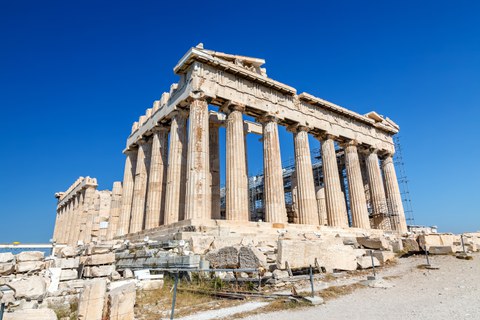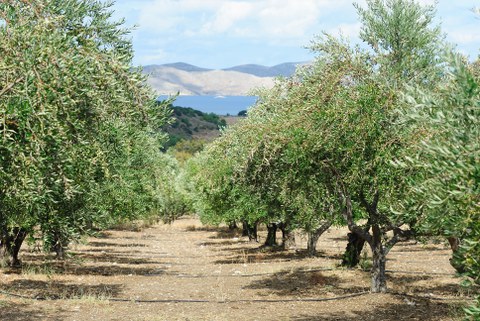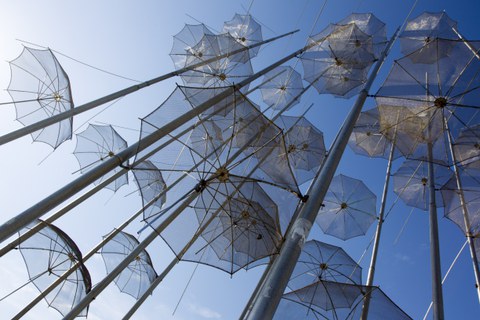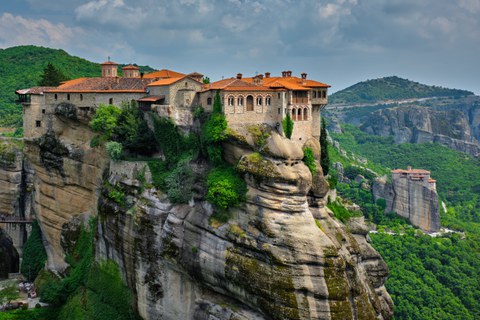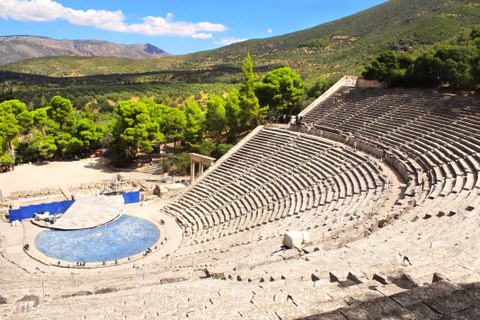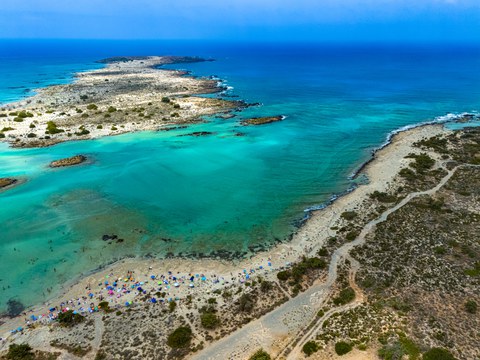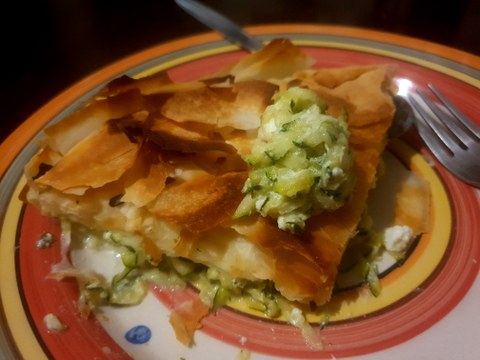Partner Country of the Month November 2023: Greece
Greece is synonymous with the temples, myths and philosophers of antiquity as well as sunny Mediterranean islands and delicious food. Greeks are known for being outgoing and hospitable people. So why not head to Greece for an exchange semester? There is much to discover. Did you know that Greece is 80% mountainous? Or that its thousands of regional dances have an old tradition but are still very much alive today?
With the "Partner Country of the Month" campaign, we want to shine a spotlight on the wide diversity of countries, regions and partner universities of TU Dresden that our students can explore during a semester abroad.
Table of contents
General facts and figures about Greece
Official name: Hellenic Republic
Capital: Athens
Population: 10.3 million (2022)
Official language: Greece
National holiday: March 25th (Independence from the Ottoman Empire)
Currency: Euro
You can find further facts, figures and information on Wikipedia or the website of the German Federal Foreign Office. For travel info, see wikivoyage or visitgreece.gr.
Language matters
- Hello / bye – Γεια σου ya su, or polite / to a group: Γειά σας ya sas
- Good morning – καλημέρα kaliméra
- How are you? – Tι κάνεις ti kánis? Or formal / group: Τι κάνετε ti kánete?
-
My name is … – Με λένε me léne …
-
Sorry – Συγνώμη sygnómi
-
Yes / no – Ναί nai / όχι óchi
-
Please / You’re welcome – Παρακαλώ parakaló
-
Thank you – Ευχαριστώ efharistó
Greek is one of the oldest languages that are still spoken in the world. It had a formative influence on the languages of Europe and yet is not closely related to any of them. However, Modern Greek is very similar to Ancient Greek, at least in terms of vocabulary. Therefore, there are many words that you can have a good guess at, like ánthropos (human), theós (god) or fílos (friend). But beware of false friends, such as pedévo, which used to mean “to educate” and influenced the term pedagogy. Nowadays, it means “to torment”.
Good to know: In Greek, the áccent índicates the stréssed sýllable. The spelling of the Greek language has hardly changed since antiquity. Not so the grammar – and to the delight of learners, it has become less complex. Another helpful fact for learners is that Greek has no strong dialects.
Our partner universities offer a wide variety of courses in English and you can study entirely in English during your exchange. However, please check the exact requirements before applying.
In Greece, there are about as many English speakers as in Germany. With younger people, in cities and in tourist areas, there is no need to fear the language barrier. However, learning Greek will certainly help you in making friends and getting to know the culture. In Dresden, there are language courses at VHS (starting from German). Online, Filoglossia has a free beginner’s course.
Did you know that ....?
- Greece cultivates the greatest diversity of olive varieties in the world? Looking at the amount of olives produced, the country comes in third place worldwide, after Spain and Italy. The importance of olives in Greece dates back to ancient times. According to legend, the name of Athens was determined in a contest between the gods. The city was to be named after the deity who gave the best gift. While Poseidon brought water to the city, Athena’s gift of an olive tree was considered more valuable.
-
ancient Greek statues were colourfully painted? The dazzling white marble sculptures that shape our idea of antiquity (and European art history) would have looked unfinished to ancient Greeks. Sculptors and painters used to work together to make statues appear lifelike. But while the stone survived the millennia, the fragile colours layered on top have largely disappeared or were even cleaned away. However, traces of colour often remain and can be analysed and reconstructed experimentally.
- for Greeks, name days are more important than birthdays? Christianity is hugely influential in Greek culture, and many people are named for saints of the Greek Orthodox Church. On a saint’s dedicated day, people with the same name celebrate their name day. Birthday parties are mainly for children. As an advantage for the forgetful, name days are listed in the church calendar.
-
in Greece, a nod of the head means no? Specifically, it’s a nod backwards while clicking your tongue. Nodding slightly sideways and to the front means yes, but the matching “nah” (ναι, yes) can cause confusion. Also good to know: Holding out your palm to someone with your fingers spread is an insult called moutza. The gesture was a curse in ancient times, is connected to the public shaming of criminals in the Byzantine Empire, and is popular among annoyed drivers today.
-
the Greek city of Argos is considered the oldest continuously inhabited city in Europe? The first traces of settlement date back to the Neolithic period and are about 7,000 years old. Athens comes close (although exact dating is of course difficult) and holds the record among European capitals.
- the German state of Bavaria (Bayern) is spelled with a y because it looks nice and Greek? In the 19th century, Greek revolutionaries fought for independence against the Ottoman Empire, which had conquered Greece centuries ago. They were supported by Philhellenes from all over Europe – a movement of fans of the ancient civilisation. Many joined the fighting, like the British poet Lord Byron, who died a Greek national hero. King Ludwig I of Bavaria expressed his enthusiasm for Greece differently, decreeing that Baiern (the typical spelling until his time) should have a Greek Y.
Cooperation with TU Dresden
You can find all cooperations of TU Dresden in our database. Have a look at the experiences of our previous exchange students at Questionnaires. Professors at your faculty may have direct contacts to your partner university of choice and can advise you. Here you can find the contact persons and application deadlines for your faculty.
Our cooperations with Greek universities are part of Erasmus+. Here you can find the contact persons and application deadlines for your faculty.
Our cooperations with Greek universities
- Ethniko Metsovio Polytechnio in Athens
- Electrical Engineering and Information Technology
- Fluid Mechanics
- Architecture
- Lightweight Engineering and Polymer Technology
- Oikonomiko Panepistimio Athinon (OPA) in Athens
- Business Administration and Economics
- Panepistimio Dytikis Attikis in Athens
- Textile Machinery and High Performance Material Technology
- University of Patras
- Lightweight Engineering and Polymer Technology
- University of Ioannina
- Business Administration and Economics
- Polytechneio Kritis in Chania on Crete
- Hydro Sciences
- Aristotle University of Thessaloniki
- Computer Science
- Psychology
- Classical philology
- Medicine
- Electrical Engineering and Information Technology
- University of Peloponnese in Tripoli
- Classical Philology
Don't miss...
Metéora, "suspended in the air", refers to a landscape of gigantic rocks. Far up on some of their peaks sits a scattered row of medieval monasteries. They were built by monks fleeing to remote areas during the Ottoman conquest and used to be practically inaccessible. In the old days, they could only be reached via hanging ladders or baskets that were pulled up hundreds of metres on ropes. Nowadays, hiking trails lead through the wonderful landscape and up to the monasteries.The trails begin in nearby Kalabaka, which can be reached by train or bus from our partner cities Athens, Thessaloniki and Ioannina.
Athens Epidaurus Festival. If you've ever wanted to see a tragedy by Sophocles performed in a Greek amphitheatre, this is the festival for you. Every year from May to October, there are concerts, plays and dance shows, both classical and modern, Greek and international. Two great ancient theatres serve as the main venues, the Odeon of Herodes Atticus and the Theatre of Epidauros. Their acoustics still impress today - you can hear a coin falling on the stage even in the last few tiers.
Elafonísi. This small island on the southwest coast of Crete is connected to the larger island by a sandbar. When the waves are calm, you can cross over by wading through the shallow water. Close to the crossing, there are beaches with shimmering pink sand that gains its colour from tiny coral particles. On a walk along the island's coast, you can admire the dunes and small beaches hidden between dark rocks. There is a bus going to Elafonísi from our partner city of Chania.
The ancient treasures of Athens. With more archaeological museums than in any other country worldwide, you are spoilt for choice in Greece. These two are particularly worth seeing. The Acropolis Museum takes you through the history of the Athenian Acropolis, from the Bronze Age to the Byzantine Empire. A particularly magnificent section is the Parthenon Gallery with (at least many of) the sculptures and friezes that used to adorn the Temple of Athena. The National Archaeological Museum contains the most important collection on Greek antiquity, with artifacts from all regions and periods. You can admire many sculptures, vases, frescoes, gold objects, weapons, and even such surprising finds as an ancient astronomical computer.
Let's get cooking...
Greek cuisine is world-famous for dishes like tzatziki and gyros. Olives and olive oil, feta cheese, fish and seafood from the coast and goat and mutton from the mountains are typical ingredients, as well as lots of vegetables. For starters or snacks, people eat mezedes, such as dolmades (stuffed vine leaves) or Greek farmer's salad. Typical main courses include souvláki (meat skewers) or mousakas, a casserole made from potatoes, minced meat and aubergine.
During mealtimes, socialising is just as important as the food itself. It's not customary for people to order separate dishes when eating at a restaurant. Instead, the food is placed in the centre of the table and shared by everyone. Separating the bill would be considered stingy, so people take turns inviting each other.
Like so much of Greek culture, its cuisine can look back on a long history. Tiganites, honey pancakes baked in olive oil, and the sesame and honey bars pastéli were mentioned in texts from antiquity and are still popular today. Over the centuries and millennia, a lot of cultural exchange happend as well, of course. For example, Greek pita bread is the ancestor of Turkish pide. The practice of soaking pastries in sugar syrup found its way to Greece in the opposite direction.
Kolokithópita - Zucchini Pie
Phyllo dough is almost limitlessly useful in Greek cuisine. Spinach-filled Spanakopita is probably the best-known of Greek phyllo pies, but there are countless delicious versions. Other savoury pies include leek or cheese fillings, and there are sweet pies with semolina porridge or pumpkin. Here is a version with zucchini and feta cheese. If you would like to try your hand at it, you can also use homemade phyllo dough. You can find a recipe for Kolokithópita at beryl.nyc.
Contact
Have you had a great time in Greece? Do you have tips for places and experiences that are not to be missed? We would be happy to share your experiences here, on social media or, if you want, in information events for other TUD students. Get in touch with us:
 © Sven Ellger/TUD
© Sven Ellger/TUD
Advice on studying abroad
NameMs Federica Serra
Infocenter/ Study abroad; TUDworldwide: America
Send encrypted email via the SecureMail portal (for TUD external users only).
Visiting address:
Fritz Foerster Bau, Office 161 Mommsenstraße 6
01069 Dresden
Postal address:
TUD Dresden University of Technology International Office
01062 Dresden
Office hours:
- Tuesday:
- 09:30 - 11:30
- 12:30 - 14:30
- Thursday:
- 09:30 - 11:30
Please register at the SCS (FOE, floor 0).
Partner Countries Archive
Have you missed a partner country? No worries! Here you can read up on all articles.
|
Europe (Erasmus+) |
|
|
Africa |
|
|
America |
|
|
Asia |
|
|
Australia and Oceania |
|

